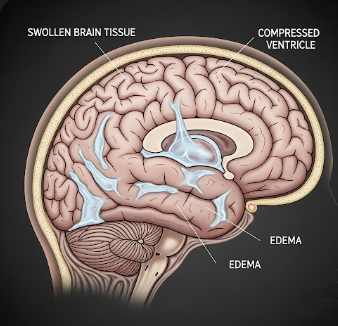Overview
Brain edema refers to the excess accumulation of fluid in the brain tissue, leading to swelling and increased intracranial pressure. This condition can occur due to trauma, stroke, infection, tumors, or other neurological disorders. Brain edema is a serious medical emergency, as the swelling can compromise brain function, reduce blood flow, and cause life-threatening complications.
In Korea, brain edema is managed in neurology, neurosurgery, and intensive care units. Korean hospitals utilize advanced imaging, monitoring techniques, and targeted medical and surgical interventions to reduce swelling, protect brain tissue, and prevent permanent neurological damage.
What is Brain Edema?
Brain edema occurs when fluid accumulates in the brain’s intracellular or extracellular spaces, causing enlargement of brain tissue. It can be classified into several types:
- Vasogenic edema: Caused by disruption of the blood-brain barrier, often due to tumors, trauma, or inflammation
- Cytotoxic edema: Results from cellular injury as in stroke, hypoxia, or toxic exposure
- Interstitial edema: Fluid buildup around ventricles, commonly due to hydrocephalus
- Osmotic edema: Triggered by rapid changes in osmotic balance, such as hyponatremia
The type of edema determines the underlying cause, treatment approach, and prognosis.
Symptoms
Symptoms of brain edema can vary depending on severity, location, and underlying cause:
- Headache: Often severe and worsening
- Nausea and vomiting due to increased intracranial pressure
- Altered consciousness: Confusion, drowsiness, or coma
- Seizures in some cases
- Visual disturbances such as blurred vision or double vision
- Weakness or numbness on one side of the body
- Difficulty speaking or understanding speech
- Coordination problems or loss of balance
Rapid onset of symptoms may indicate acute edema requiring emergency intervention, while slow-developing edema may present more subtly.
Causes
Brain edema can arise from various neurological and systemic conditions:
- Traumatic brain injury (TBI): Swelling after impact or concussion
- Stroke: Ischemic or hemorrhagic strokes cause cytotoxic or vasogenic edema
- Brain tumors: Malignant or benign tumors disrupt normal tissue and vascular integrity
- Infections: Meningitis, encephalitis, or abscesses
- High altitude cerebral edema: Rapid ascent to high altitudes
- Hypoxia or anoxia: Oxygen deprivation in cases of cardiac arrest or respiratory failure
- Metabolic disturbances: Severe hyponatremia or hyperglycemia
- Surgery or radiation therapy: Can trigger localized swelling
Risk Factors
- Head trauma from accidents, falls, or sports injuries
- Stroke or cardiovascular disease
- Brain tumors or metastasis
- Severe infections of the brain or meninges
- High-altitude exposure without acclimatization
- Chronic illnesses affecting fluid balance or oxygenation
- Elderly individuals due to fragile brain tissue
Complications
Brain edema can lead to life-threatening complications if untreated:
- Increased intracranial pressure (ICP), compressing brain structures
- Herniation syndromes, where brain tissue shifts abnormally
- Permanent neurological deficits, including paralysis or cognitive impairment
- Seizures and persistent epilepsy
- Respiratory failure due to brainstem compression
- Death in severe, untreated cases
Prevention
While some causes of brain edema cannot be fully prevented, certain measures reduce risk:
- Wearing protective gear during sports or high-risk activities to prevent head injury
- Controlling cardiovascular risk factors such as hypertension and diabetes
- Early management of stroke and infections to minimize secondary brain swelling
- Gradual acclimatization to high-altitude environments
- Monitoring electrolyte and fluid balance in hospitalized or critically ill patients
- Regular check-ups for patients with known brain tumors or neurological disorders
Treatment Options in Korea
Diagnosis
Accurate diagnosis and monitoring are essential:
- CT scan (computed tomography): Rapid assessment of swelling, bleeding, or structural changes
- MRI (magnetic resonance imaging): Detailed imaging of brain tissue and edema type
- Intracranial pressure monitoring: Direct measurement in severe cases
- Electroencephalography (EEG): Evaluates seizure activity related to edema
- Blood tests: Assess electrolytes, infection markers, and organ function
Medical Management
Treatment focuses on reducing brain swelling, managing underlying causes, and preventing complications:
- Osmotic therapy: Mannitol or hypertonic saline to draw fluid out of brain tissue
- Corticosteroids: Reduce inflammation-related vasogenic edema
- Diuretics: Aid in fluid management
- Anticonvulsants: Prevent seizures triggered by edema
- Oxygen therapy: Ensure adequate brain oxygenation in hypoxic patients
- Antibiotics or antivirals if infection is the underlying cause
Surgical Management
- Decompressive craniectomy: Removing part of the skull to relieve pressure in severe edema
- Ventriculostomy: Drainage of cerebrospinal fluid in interstitial edema or hydrocephalus
- Tumor resection or abscess drainage when the edema is secondary to space-occupying lesions
- Endovascular procedures for stroke-related edema
Supportive Care
- Intensive monitoring in ICU for critically ill patients
- Head elevation and positioning to reduce intracranial pressure
- Nutritional support and hydration management
- Physical and occupational therapy during recovery
- Psychological counseling for patients and families coping with neurological deficits
Prognosis
The prognosis of brain edema depends on cause, severity, and timeliness of treatment:
- Mild edema caused by minor trauma or moderate stroke often resolves completely with treatment
- Severe edema from large hemorrhages, high-grade tumors, or major trauma carries higher risk of permanent deficits or death
- Early detection and intervention significantly improve survival rates and reduce neurological complications
- Korean hospitals provide cutting-edge neurocritical care, neurosurgery, and rehabilitation, enhancing patient outcomes and quality of life
- Long-term follow-up with imaging and rehabilitation programs ensures optimal recovery and prevents recurrence
With advanced imaging, intensive care, and multidisciplinary treatment teams, Korea offers state-of-the-art care for brain edema, aiming to reduce mortality, restore neurological function, and support full recovery.













